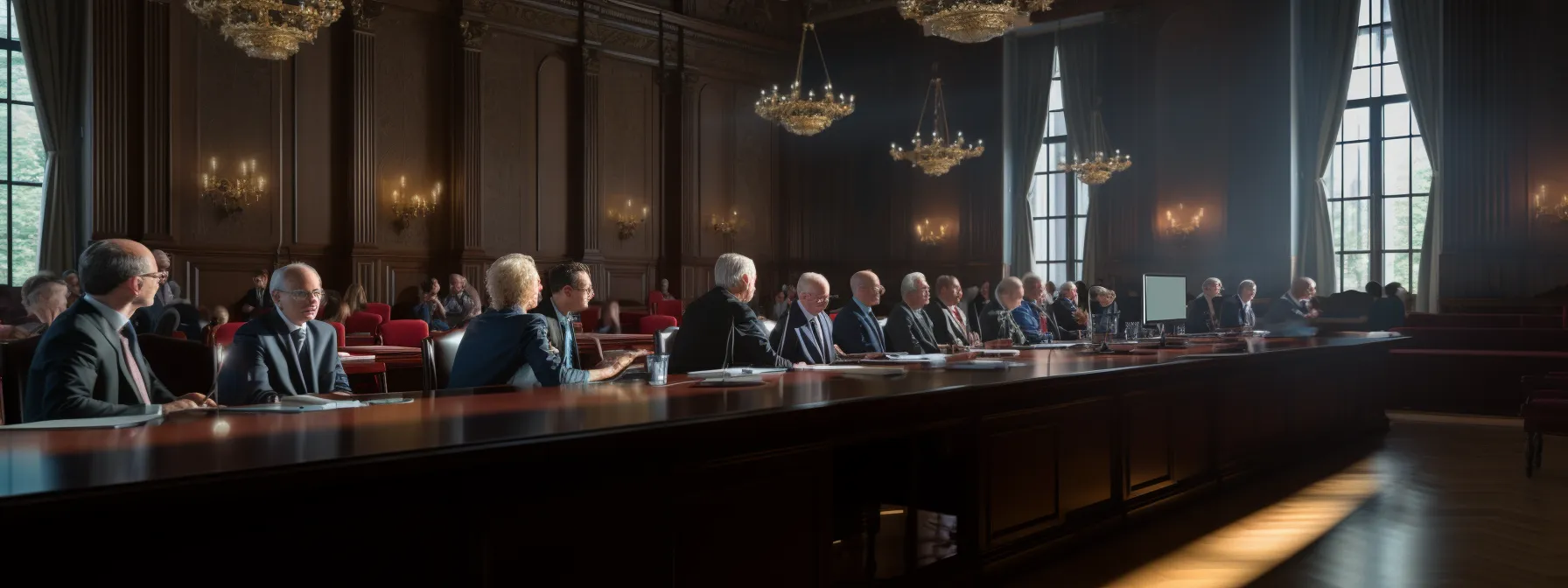As the landscape of global commerce continuously evolves, international arbitration adapts, embracing state-of-the-art trends set to redefine its trajectory in 2024.
Legal professionals and corporations alike must grapple with the increased integration of technology, alongside the upsurge in focus on environmental, social, and governance issues within the arbitration process. An arbitrator plays a crucial role in this process.
The terrain grows ever more complex as geopolitical shifts and legal reforms in pivotal jurisdictions contribute to the dynamic nature of cross-border dispute resolution.
These developments not only reflect the current pulse of international business but also signal the course for impending transformations in resolving conflicts.
Keep reading to explore the expansive horizon of international arbitration and prepare for the changes that lie ahead concerning International Arbitration trends for 2024.
Key Takeaways
- The Year 2024 Marks a Significant Shift in the Integration of Technology in International Arbitration, With Virtual Platforms and Tools Revolutionizing the Efficiency and Accessibility of Dispute Resolution
- The Rise of Environmental, Social, and Governance (ESG) Concerns in International Arbitration Necessitates a Nuanced Approach, Where Ethical Considerations and the Impact of Business Activities on the Environment and Communities Are Given Equal Importance
- The Geopolitical Dynamics of the World in 2024 Have a Tangible Influence on International Arbitration, Requiring Arbitrators to Navigate Political Upheavals and Economic Sanctions With Impartiality and Independence
- Legal Frameworks in Key Jurisdictions Are Evolving to Create Arbitration-Friendly Environments While Ensuring Alignment With Global Standards, Reflecting a Commitment to Harmonization and Tailored Arbitration Experiences
- International Arbitration Emerges as the Preferred Method for Resolving Intellectual Property (IP) Disputes in the Creative and Technology Sectors, Offering a Confidential and Specialized Venue for Fair and Informed Resolutions
Essential Key Takeaways for Optimizing Gravity Forms Usage
Key players in international arbitration acknowledge the transformative power of technology: it acts as a beacon guiding the sector through previously uncharted territory. Remote hearings, once a necessity driven by global crises have become a testament to the resilience and adaptability of arbitration practices. The pivot towards digital solutions symbolizes a profound shift in the gathering of evidence, the conducting of hearings, and even the rendering of awards according to the arbitration rules of the American Arbitration Association.
It is no surprise, then, that a roster of emerging technologies garners unanimous attention amongst arbitrators and legal experts:
- Blockchain for immutable record-keeping
- Artificial intelligence in evidence analysis
- Secure online case management platforms
- Advanced video conferencing systems for virtual hearings
This trajectory is informed not merely by preference but by the reality of a globalized market, where geographical constraints fade and parties seek resolutions without borders. Momentum gathers virtual reality (VR) tools that promise a three-dimensional immersion into hearings and evidence, proving that the frontiers of international investment arbitration are not only crossed but expanded. A transformation once imagined is actively unfolding, marking 2024 as a pivotal year in the application of technology in investment treaty arbitration and in general international arbitration trends for 2024.
The Rise of Environmental, Social, and Governance (ESG) Issues in Arbitration

With heightened global sensitivity towards sustainability, arbitration faces a wave of Environmental, Social, and Governance (ESG) concerns that redefine the dynamics of dispute resolution. Stakeholders now engage actively with issues that once lingered at the periphery, bringing them to the forefront in international arbitral proceedings. The year 2024 stands as a pivotal moment for this shift, signaling an era where ethical considerations are not only recognized but instituted as pivotal aspects of international arbitration law agendas.
Arbitrators encounter an increasing number of cases where ESG factors are profoundly interwoven with commercial disputes. It compels nuanced approaches to arbitration where not only the letter of the law is considered but also the spirit, as arbitrators dissect the impact of business activities on the environment and communities. The rise of these concerns showcases an arbitration community ready to assume a role that encompasses the stewardship of more than just vested financial interests. The American Arbitration Association rules have been instrumental in guiding these arbitration proceedings.
Corporate participants are prompted to anticipate and navigate the complexities ESG factors introduce into arbitration. Proactive measures are adopted to align business practices with ESG principles, preemptively addressing potential areas of conflict. The motivations behind this embrace both the mitigation of risk and the cultivation of a reputation for corporate responsibility – a testament to the growing emphasis on sustainable and ethical business operations in today’s society.
Amidst this evolution, institutional responses to ESG-related disputes escalate both in sophistication and influence. The year 2024 witnesses the crafting of specialized arbitration rules and frameworks that incorporate ESG standards, facilitating a more coherent approach to such controversies. These developments underscore the American arbitration association commercial rules of the arbitration sphere’s commitment to adapting its mechanisms in step with the expanding terrain of global commerce and international law.
Shifts in Geopolitical Dynamics and Their Impact on Arbitration

As nations recalibrate their foreign policies and alliances, the stage is set for significant shifts in geopolitical dynamics, imparting a tangible influence on international arbitration trends in 2024. The ripple effects of these changes are discernible in the selection of arbitration seats, the choice of applicable law, and the enforceability of arbitral awards across jurisdictions. These alterations demand a strategic approach, sensitive to the nuances of the current geopolitical climate, and the international law of arbitration.
Arbitrators navigate the challenges brought forth by political upheavals and economic sanctions that redefine the boundaries of dispute resolution. Notably, the sanctity of the arbitration process hinges on the impartiality and independence of arbitrators, tasks now weighted with greater complexity against a backdrop of intensified national interests and international relations tensions.
The reconfiguration of global trade networks, accelerated by regional partnerships and the emergence of new economic blocs, prompts a reevaluation of traditional arbitration approaches. Arbitral institutions and practitioners adapt nimbly, ensuring the relevancy of arbitration mechanisms to parties ensnared in the intersection of commerce and shifting geopolitical landscapes. The United Nations Commission on International Trade Law plays a crucial role in shaping the future of arbitration.
Amid these transitions, dispute resolution protocols are tailored to anticipate and absorb the shocks of fluctuating geopolitical relations. International arbitration in 2024 represents a theatre where arbitrators, panelists, and the interplay of global politics and commerce are deftly managed, safeguarding the integrity of arbitration as a resilient method for resolving cross-border disputes.
Developments in Arbitration Laws and Practices in Key Jurisdictions

As international arbitration continues to evolve, developments in legal frameworks across key jurisdictions serve as guideposts for the diversifying landscape: they signal a shift toward harmonization yet underscore the unique adaptations each locale undertakes. In regions bustling with commercial activity, amendments to arbitral legislation reflect a clear intent to cement arbitration-friendly environments while ensuring alignment with global standards.
| Jurisdiction | Legislative Amendment | Impact on Arbitration |
|---|---|---|
| Singapore | Enhanced procedural autonomy in arbitration | Flexibility and tailored arbitration experiences |
| United Kingdom | Clarification of arbitration confidentiality scope | Strengthened trust in the arbitration process |
| United Arab Emirates | Expansion of arbitral subject-matter competencies | Broader applicability of arbitration proceedings |
| France | Streamlining of enforcement procedures | Enhanced efficacy of arbitral awards implementation |
In Asia, jurisdictions like Singapore demonstrate a steadfast commitment to refining their arbitration regime: recent legal updates grant parties more control over the arbitration process, highlighting the city-state’s dedication to fostering a competitive edge. These legislative changes elevate procedural autonomy, providing stakeholders the leverage necessary for crafting bespoke arbitration experiences tailored to their needs and including arbitration clauses.
Turning to the UK, the spotlight shines on a renewed discussion around arbitration confidentiality: a concept at the heart of arbitration’s appeal. Legislators are clarifying the realms within which arbitration details are shielded from public view, thereby reinforce the security and privacy valued by international businesses.
A glimpse into the Middle East reveals the UAE’s strides in broadening the horizons of arbitrable matters: this development underscores a strategic intention to accommodate a wider array of controversies within the arbitral framework. As commercial landscapes diversify, such legislative flexibility serves as a beacon for the region’s arbitration prospects. The role of an arbitrator is crucial in ensuring a fair resolution of disputes.
The Role of Arbitration in Resolving International Intellectual Property Disputes

The landscape of intellectual property (IP) disputes undergoes a sea change as international arbitration emerges as the fulcrum for resolution in the creative and technology sectors. With the escalation of cross-border transactions and collaborations, arbitration offers a confidential and specialized venue for hashing out complex IP conflicts. The convergence of legal expertise and technological savvy in arbitral tribunals equips them to traverse the intricate ethos of IP law, providing a fertile ground for fair and informed resolutions.
Arbitration’s ascendancy in this domain reflects the mounting preference for its agility and expertise, particularly when tackling the nuances of patents, trademarks, and copyright disputes on a global scale. Parties entwined in IP contentions opt for arbitration to circumvent the prolonged and unpredictable litigation routes, drawing upon arbitrators’ proficiency to swiftly navigate through the techno-legal maze. The trend reflects an undeniable shift towards arbitration’s tailored approach, one that upholds the principles of neutrality and enforceability, critical in the fast-paced realm of IP.
Intellectual Property Trends in International Arbitration for 2024
As the custodian of innovation and creative works, the year 2024 witnesses arbitration solidifying its role, bolstered by the establishment of specialized IP arbitration centers and protocols. These institutions sprout across key innovation hubs, embedding best practices and cutting-edge knowledge into their foundations, setting precedence for the amicable and judicious resolution of IP disputes. Their emergence marks a renewed confidence in arbitration’s capability to safeguard the sanctity of intellectual capital. The United Nations Commission on International Trade Law (UNCITRAL) plays a crucial role in shaping AAA arbitration rules and promoting effective dispute resolution procedures.
The evolving dynamics of IP arbitration underscore the need for comprehensive legal frameworks that promote harmonization while respecting jurisdictional idiosyncrasies. The push towards creating a cohesive arbitral environment beckons a surge in treaties and agreements that aim to enhance predictability and cross-border cooperation in IP dispute resolution. Amidst this transformation, international arbitration asserts itself as the vanguard for the protection and resolution of IP rights, reflecting its stature as an essential instrument in the 2024 sphere of global commerce. The ICSID is at the forefront of investment disputes.
Conclusion

In the dynamic panorama of international dispute resolution, 2024 stands as a transformative year for international arbitration, marked by the embrace of burgeoning trends and the anticipation of unforeseen challenges. The legal fraternity continues to adapt with agility, ensuring arbitration remains at the cutting edge as a preferred method for resolving cross-border disputes.
Technological innovations have indelibly altered the terrain, offering seamless integration and enhancing the efficiencies of the arbitral process. As arbiters and practitioners forge ahead, their foresight in leveraging digital advancements underscores a commitment to progress and excellence in their field.
With the growing emphasis on ESG considerations and the ever-evolving geopolitical landscapes, the arbitration community demonstrates a keen acumen in addressing these pivotal aspects of the modern era. By responding proactively, the world of international arbitration upholds its relevance and continues to provide a robust framework for fair and effective dispute resolution.
Reflective of its unmoving adaptability, international arbitration strides into the future, increasingly defined by its role in fostering global commercial harmony and the rule of law. As new frontiers emerge, the landscape of international arbitration is ripe for exploration, with 2024 being a testament to its resilience and unwavering capacity for innovation.
Conclusion
In 2024, international arbitration is navigating new frontiers, embracing emerging trends that showcase its resilience and capacity for innovation.
Technological enhancements are revolutionizing the process, integrating digital tools that improve efficiency and accessibility.
As the global community becomes increasingly aware of ESG issues, arbitration is adapting to incorporate these ethical dimensions into its practice.
The geopolitical landscape exerts significant influence on arbitration, prompting strategic adjustments to maintain fairness and enforceability.
Legal developments in key jurisdictions reflect a harmonious balance between local adaptation and global standards, reinforcing the role of arbitration as an arbiter for international commerce. Moreover, the New York Convention reinforces the enforceability of arbitration awards and promotes investment arbitration. Furthermore, arbitration is becoming increasingly preferred as the primary method for resolving complex international intellectual property disputes, effectively combining legal expertise with technological acumen. Collectively, these trends underscore the arbitration community’s commitment to progress and excellence, ensuring that arbitration remains a robust method for resolving cross-border disputes in the face of evolving global dynamics. For more information and guidance on international arbitration, please visit our legal articles on international arbitration.


